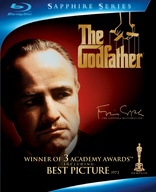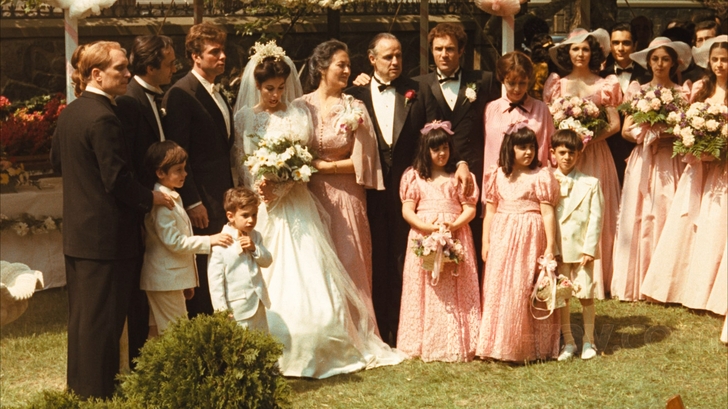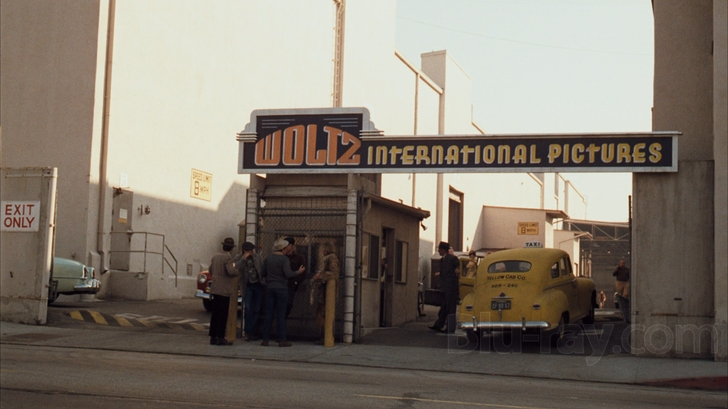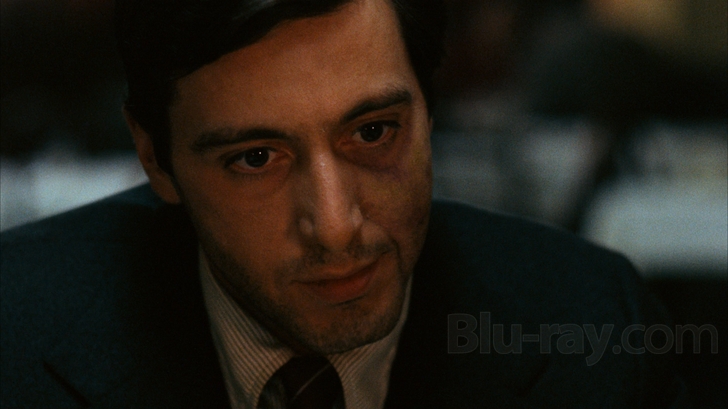The Godfather Blu-ray Movie
HomeThe Godfather Blu-ray Movie 
Sapphire SeriesParamount Pictures | 1972 | 177 min | Rated R | Feb 02, 2010

Movie rating
9.2 | / 10 |
Blu-ray rating
| Users | 4.5 | |
| Reviewer | 4.5 | |
| Overall | 4.5 |
Overview
The Godfather (1972)
An epic tale of a 1940s New York Mafia family and their struggle to protect their empire from rival families as the leadership switches from the father to his youngest son.
Starring: Marlon Brando, Al Pacino, James Caan, Richard S. Castellano, Robert DuvallDirector: Francis Ford Coppola
| Drama | Uncertain |
| Epic | Uncertain |
| Crime | Uncertain |
| Period | Uncertain |
| Melodrama | Uncertain |
Specifications
Video
Video codec: MPEG-4 AVC
Video resolution: 1080p
Aspect ratio: 1.78:1
Original aspect ratio: 1.85:1
Audio
English: Dolby TrueHD 5.1 (48kHz, 24-bit)
English: Dolby Digital 2.0 Mono (192 kbps)
French: Dolby Digital 5.1 (640 kbps)
Spanish: Dolby Digital 5.1 (640 kbps)
Subtitles
English, English SDH, French, Portuguese, Spanish
Discs
50GB Blu-ray Disc
Single disc (1 BD)
Packaging
Slipcover in original pressing
Playback
Region free
Review
Rating summary
| Movie | 5.0 | |
| Video | 5.0 | |
| Audio | 4.5 | |
| Extras | 1.5 | |
| Overall | 4.5 |
The Godfather Blu-ray Movie Review
The iconic classic is afforded an individual release without the wealth of bonus content included on The Godfather Collection.
Reviewed by Dustin Somner February 7, 2010Reviewing a production as profound as The Godfather is a great pleasure and also an exercise in futility. Those who haven’t seen the film aren’t likely to rush out and grab a copy based solely on my affectionate analysis, and long-time fans shouldn’t need additional prodding. As such, I’ll leave the rigorous debating to the film historians, and simply focus on the success of the film, as well as my personal opinion on its relevance.
Last year, I went on a 26-mile backpacking trip with a group of six friends with a variety of backgrounds. One of the guys in the group was raised without a television, and spent the better part of his 20’s catching up on everything he missed in his childhood. As an outdoor lover, I find it hard to criticize anyone who chose to promote physical activity rather than sitting in front of the television, so despite the shock of a television-free childhood, I could understand his parents reasoning. What I couldn’t understand, is how he managed to dig into everything under the sun during the past 12 years, and never take the time to watch The Godfather trilogy. He earned his fair share of group chastising while the rest of us praised Coppola’s cinematic gems, and eventually promised to watch the films back-to-back during the inevitable recovery period at the conclusion of our trip. Whether or not he followed through is irrelevant, but our group discussion of The Godfather brought two things to light. First, I’ve never stumbled across another film series with such a loyal following. If you walk down the street and ask ten people if they’ve seen The Godfather, I’d imagine nine of them will say yes. Second, everyone who views the film will come away with a different analysis of what makes it so profound. Coppola didn’t simply make an entertaining film; he made a masterpiece with limitless appeal.

There's one key family member missing from this image.
Don Vito Corleone (Marlon Brando) is a well-respected leader among the Italian-American community. Hidden beneath the exterior of a businessman in the olive oil trade, Vito is a charming dictator with his hands in a variety of legitimate and criminal ventures. One day, the Corleone patriarch is approached by the representative of a rival family with a request for assistance in a profitable narcotics venture, which Vito refuses. This sets off a tragic war between the two families, and eventually leads to a leadership transfer from Vito to his son Michael (Al Pacino). Michael is a well-educated young man with conflicting ambitions. On the one hand, he wants to legitimize the family business and escape the violent world of organized crime. However, he soon realizes the rival families are out to ruin the Corleone family, and intend to remove the head of the organization in order to cripple the body. With a constant target on his back, Michael is forced down a crash-course on betrayal and deception, as he furiously battles to protect everything his father built.
Nominated for eleven Academy Awards and winner of three (Best Picture, Best Writing, and Best Actor in a Leading Role for Marlon Brando), the 1972 release of The Godfather is an epic portrayal of organized crime, told through the sympathetic eyes of the individuals embroiled within the conflict. Heroes become villains and vice-versa, until the lines between good and evil converge onto a singular path. In many ways, the meteoric rise of the Corleone family could be compared to the rise of the American nation in the years following World War II, making The Godfather the quintessential “American” movie during the early 1970’s. Naturally, there are a myriad of reasons why the film became such a huge success, but to this viewer it boils down to two key factors. Pure, unapologetic glee at witnessing the power of greed coupled with self-righteousness, and the violent struggle that results when humans attempt to take what isn’t theirs. In my personal opinion, there has never been another film (except perhaps The Godfather, Part II) that captures the essence of a lifestyle that seems entirely foreign to 99.9 percent of the population, but also draws an associative link with 90 percent of viewers. I still can’t comprehend how Coppola pulled off the balance in such a rewarding fashion, but it remains a true testament to his ability as a director.
Despite Marlon Brando’s iconic portrayal of Don Vito Corleone and his resulting Best Actor award, this will always be Al Pacino’s film. Stepping into the shoes of Michael Corleone had to be an ominous undertaking for a 32 year-old actor with only two films under his belt, but Pacino quickly demonstrated his worth as the conflicted successor to the family business. Standing next to accomplished actors such as Marlon Brando, Robert Duvall, and James Caan, Pacino likely felt like a fish out of water during the initial days of filming, but when you consider his character is initially portrayed as an outcast from the family business, he seems the perfect fit for Coppola’s vision. His slight frame, wide-eyed expressions, and unusual tendency to hunch over make him appear far less capable of filling his father’s massive shoes. Yet his vicious cunning and willingness to do whatever it takes draws the respect of his peers, and propels him into an almost god-like status. I often wonder where the Pacino of those days disappeared to, but perhaps we’re simply realizing the importance of a talented director in bringing out the best in his actors.
The Godfather Blu-ray Movie, Video Quality 

Presented in 1080p utilizing the AVC codec (at an average bitrate of 26Mbps), The Godfather looks better than I ever thought possible. The restoration efforts by Robert Harris and the MPI group are nothing short of amazing, especially when you consider the exhaustive effort they put into tracking down negatives with the least damage. One of the highlights on the boxed set of the complete collection is an informative documentary by Francis Ford Coppola, Robert Harris (restoration expert), and Gordon Willis (cinematographer), covering the restoration process in detail. Those of you who never viewed The Godfather during the days of VHS or any other point during the past 38 years should take the opportunity to witness the level of effort required to restore the film.
Now that we have that out of the way, I should make it abundantly clear this is an exquisite restoration that pays homage to the original intent of the filmmakers. It's not meant as demo-worthy material for your new HD display, and may seem off-putting to newcomers of the film. The original layers of grain are left intact, skin tones vary in shade from scene to scene, and there are abrupt reductions in fine object detail. Those who don't know better might pass these off as worrisome elements, but this is precisely how the film was created to look. Adding to the stylistic nature of the cinematography, the color palette reveals a constant push toward yellow, facial tones dance from red to orange, and blacks crush every last detail in the backgrounds. In many cases we'd consider these tendencies a bit troublesome (if this were a recent production), but given the age of the film and creative manner in which Coppola and Willis transport viewers back to a distant point in American history, I wouldn't want it any other way. For long-time fans this is a true revelation, so there's never been a better time to experience the rich visual style of Coppola's masterpiece.
The Godfather Blu-ray Movie, Audio Quality 

Delivered in TrueHD 5.1, the primary audio track is nearly as impressive as the visual presentation, though Paramount's likely faced with a small number of fans prepared to cry foul over the decision to tinker with the original mono track. Fortunately, the mono offering is still provided on the disc, but I'd wager most viewers will opt for the newly remastered lossless track. As such, I've stuck with the lossless offering for this review, and found the results immensely satisfying. Beginning with the musical score by Nino Rota, we realize a dramatic sense of immersion and depth in the rich instrumental numbers that orchestrate the changes in emotional tone throughout the film. A mono soundtrack simply can't create the same effect as a robust (surround) musical experience, and it's in that element where we realize the greatest gain in the transition to multi-channel audio. Other elements in the mix are also enhanced, but listening to the dialogue and surround effects, I still had a sneaking suspicion they were mostly emanating from the front sound stage. This shouldn't be seen as a disservice to the overall audio experience (given the source material), but it's worth mentioning to anyone who's hoping for a jaw-dropping upgrade. Aside from the improvements in the musical department, the most profound progress can be found in the overall richness or tone of the track. Gone are the occasional moments of hiss or dropout, dialogue never descends into muffled territory, and intricacies in the environment of each scene are afforded more weight in the well-balanced track. When it comes to value-added audio tracks, this one ranks near the top.
The Godfather Blu-ray Movie, Special Features and Extras 

This is the one area where I feel compelled to downgrade the individual "Sapphire Series" release of the first two films (the third entry in the trilogy was left out since it didn't win an Academy Award, despite receiving seven nominations). Given the wealth of supplements included on the bonus disc of the The Godfather Collection, I can't fathom how any fan could be satisfied with the mere inclusion of Coppola's audio commentary track on each disc. When I say mere, I'm not downplaying the significance of the director's in-depth discussion of the film's production, story, themes, and actors, but simply pointing out the value that's lost when you remove the excellent documentaries included in the full set.
In the end, this is the version to get if you're only concerned with owning the films themselves, and bonus materials are of little concern (or if you kept the prior DVD bonus features and are uninterested in the newly added HD content). Personally, I found the documentary on the restoration process worth the price of admission alone, so I fall in the camp that would rather own the complete collection.
The Godfather Blu-ray Movie, Overall Score and Recommendation 

If you chose not to pick up the original 4-disc collection containing The Godfather trilogy, and you despise The Godfather, Part III enough to pass on the wealth of special features included in the prior release, this is your opportunity to add a historical classic to your collection. From a personal standpoint, I'd much rather own all three films and a wealth of special features, but that's coming from a guy who doesn't dislike the third entry in the series. From a technical point of view, this is the same lovely presentation featured in the original set, which stands as the definitive example of what's possible when you clean the original elements rather than tampering with them.
Other editions
The Godfather: Other Editions

The Godfather
Paramount 100th Anniversary
1972

The Godfather
The Coppola Restoration
1972

The Godfather
The Coppola Restoration
1972

The Godfather
Sapphire Series
1972

The Godfather
1972

The Godfather
50th Anniversary Edition
1972

The Godfather 4K
1972

The Godfather 4K
1972

The Godfather 4K
1972
Similar titles
Similar titles you might also like

The Godfather: Part II 4K
1974

The Godfather: Part III
1990

Once Upon a Time in America
Extended Director's Cut
1984

Casino 4K
1995

GoodFellas
1990

Carlito's Way 4K
1993

The Irishman
2019

Boardwalk Empire: The Complete Fifth Season
2014

There Will Be Blood
2007

Live by Night
2016

The Wolf of Wall Street 4K
2013

Road to Perdition
2002

Scarface 4K
Gold Edition
1983

The Shawshank Redemption 4K
1994

Gangs of New York
Remastered
2002

Donnie Brasco
Theatrical Edition
1997

The Godfather, Coda: The Death of Michael Corleone 4K
1990

A Most Violent Year
2014

The Sopranos: The Complete Series
1999-2007

The Place Beyond the Pines 4K
2012